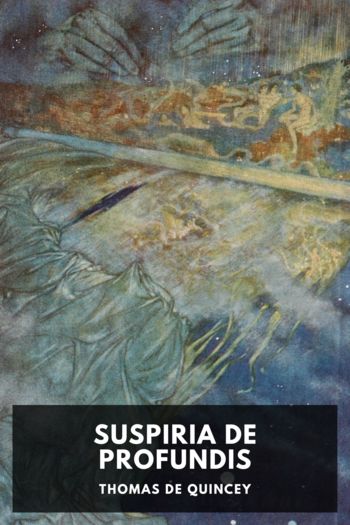Confessions of an English Opium-Eater by Thomas De Quincey (the rosie project txt) 📕

- Author: Thomas De Quincey
Book online «Confessions of an English Opium-Eater by Thomas De Quincey (the rosie project txt) 📕». Author Thomas De Quincey
This, then, let me repeat, I postulate—that at the time I began to take opium daily I could not have done otherwise. Whether, indeed, afterwards I might not have succeeded in breaking off the habit, even when it seemed to me that all efforts would be unavailing, and whether many of the innumerable efforts which I did make might not have been carried much further, and my gradual reconquests of ground lost might not have been followed up much more energetically—these are questions which I must decline. Perhaps I might make out a case of palliation; but shall I speak ingenuously? I confess it, as a besetting infirmity of mine, that I am too much of an Eudæmonist; I hanker too much after a state of happiness, both for myself and others; I cannot face misery, whether my own or not, with an eye of sufficient firmness, and am little capable of encountering present pain for the sake of any reversionary benefit. On some other matters I can agree with the gentlemen in the cotton trade15 at Manchester in affecting the Stoic philosophy, but not in this. Here I take the liberty of an Eclectic philosopher, and I look out for some courteous and considerate sect that will condescend more to the infirm condition of an opium-eater; that are “sweet men,” as Chaucer says, “to give absolution,” and will show some conscience in the penances they inflict, and the efforts of abstinence they exact from poor sinners like myself. An inhuman moralist I can no more endure in my nervous state than opium that has not been boiled. At any rate, he who summons me to send out a large freight of self-denial and mortification upon any cruising voyage of moral improvement, must make it clear to my understanding that the concern is a hopeful one. At my time of life (six-and-thirty years of age) it cannot be supposed that I have much energy to spare; in fact, I find it all little enough for the intellectual labours I have on my hands, and therefore let no man expect to frighten me by a few hard words into embarking any part of it upon desperate adventures of morality.
Whether desperate or not, however, the issue of the struggle in 1813 was what I have mentioned, and from this date the reader is to consider me as a regular and confirmed opium-eater, of whom to ask whether on any particular day he had or had not taken opium, would be to ask whether his lungs had performed respiration, or the heart fulfilled its functions. You understand now, reader, what I am, and you are by this time aware that no old gentleman “with a snow-white beard” will have any chance of persuading me to surrender “the little golden receptacle of the pernicious drug.” No; I give notice to all, whether moralists or surgeons, that whatever be their pretensions and skill in their respective lines of practice, they must not hope for any countenance from me, if they think to begin by any savage proposition for a Lent or a Ramadan of abstinence from opium. This, then, being all fully understood between us, we shall in future sail before the wind. Now then, reader, from 1813, where all this time we have been sitting down and loitering, rise up, if you please, and walk forward about three years more. Now draw up the curtain, and you shall see me in a new character.
If any man, poor or rich, were to say that he would tell us what had been the happiest day in his life, and the why and the wherefore, I suppose that we should all cry out—Hear him! Hear him! As to the happiest day, that must be very difficult for any wise man to name, because any event that could occupy so distinguished a place in a man’s retrospect of his life, or be entitled to have shed a special felicity on any one day, ought to be of such an enduring character as that (accidents apart) it should have continued to shed the same felicity, or one not distinguishably less, on many years together. To the happiest lustrum, however, or even to the happiest year, it may be allowed to any man to point without discountenance from wisdom. This year, in my case, reader, was the one which we have now reached; though it stood, I confess, as a parenthesis between years of a gloomier character. It was a year of brilliant water (to speak after the manner of jewellers), set as it were, and insulated, in the gloom and cloudy melancholy of opium. Strange as it may sound, I had a little before this time descended suddenly, and without any considerable effort, from 320 grains of opium (i.e. eight16 thousand drops of laudanum) per day, to forty grains, or one-eighth part. Instantaneously, and as if by magic, the cloud of profoundest melancholy which rested upon my brain, like some black vapours that I have seen roll away from the summits





Comments (0)